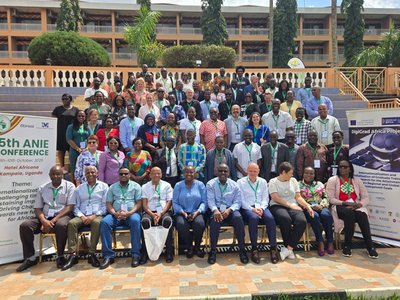

The 15th Annual Conference of the Africa Network for Internationalization of Education (ANIE) was held from 8-10 October 2025, in Kampala, Uganda. The conference brought together stakeholders from across Africa and beyond to discuss the challenges and opportunities facing higher education on the continent in a rapidly changing geopolitical landscape. With the theme "Internationalization in challenging times: Sustaining Impact, Driving Change towards New Futures for Africa," the conference focused on how African institutions could navigate these transformations and strengthen international partnerships.
The event explored several sub-themes in parallel panels, including the development of resilient partnerships, creating inclusive and equitable policy frameworks, and integrating African epistemologies into curricula. Discussions also addressed the need to rebalance power dynamics in global academic collaborations and amplify African scholarly voices in research, policy, and practice. Participants shared successful models of African-led international collaborations and research, while also engaging in conversations about the future of financing and funding strategies for internationalization efforts. Targeting a wide audience, the conference attracted university leaders, researchers, policymakers, funding agencies, students, and NGOs, all contributing to the development of inclusive, sustainable, and transformative educational practices.
At the opening of the conference, the keynote speaker reminded the audience once more that proper internationalization in Africa could not be achieved without a decolonial approach. He recalled the colonial origins of many African higher education institutions (including the prestigious Makerere University in Uganda) and the disregard for indigenous cultures that characterized the colonial era. Universities in Africa were often European cultural imports aimed at educating colonial administrators. This culture continues in some places; therefore, internationalization often means bringing knowledge and people from the Global North to Africa or sending African students to the Global North to learn knowledge that is sometimes not applicable at home. However, as was argued, Africa should not simply be treated as object and provider of data in the context of internationalization. The ANIE network formulated this principle: 'Nothing about us without us'. ANIE is committed to reversing this trend and rethinking internationalization in an African context to determine its applicability to the local context. This means not only bringing things from outside, but also exporting the African context, as well as African lived experiences and knowledge, to the world.
The OeAD was represented at the conference by Dr. Rainer Einzenberger who organized a panel discussion titled: Building Resilient Partnerships in Times of Conflict and Geopolitical Insecurity: The case of APPEAR and Africa-UniNet. Following his introductory presentation on the APPEAR programme, Africa-UniNet and Cooperation Development Research (KoEF), he discussed some of the challenges which projects were facing given the current number of conflicts and geopolitical insecurity but also the achievements of these programs and network activities. Further he emphasized the need to increase the resilience of partnerships in times of crisis. Resilience can be increased not only on an individual level but also on an institutional level, highlighting some critically important issues. This input was further complemented by a panel discussion with project partners/members of APPEAR and Africa-UniNet. In this discussion, which was chaired by Dr. James Jowie of ANIE, Dr. Gloria Lamaro (Gulu University) and Dr. Harriet Kebirungi (Kyambogo University) provided examples of how the activities within the framework of APPEAR or Africa-UniNet contributed to the transformation of their respective institutions. One example included the implementation of gender policy and gender budgeting at Kyambogo University, one of the first in Uganda. They further provided suggestions to improve the partnerships and enhance sustainability and resilience.
During the conference several insightful studies and papers were presented as for instance by Prof. Emnet Tadesse Woldegiorgis (University of Johannesburg) who presented a study on Emerging Trends and Challenges of Internationalization in African Higher Education Institutions during the post-pandemic period. Drawing on data from 32 universities across 15 countries, the study analyzed how African institutions conceptualize and implement internationalization within their strategies, partnerships, and curricula and what challenges they are facing. It found that structural dependence on the Global North remains dominant accounting for up to 89% of research funding between 2020 and 2021. However, there are emerging signs of diversification. Partnerships with Asian countries such as China, India, Japan, and South Korea have grown significantly, reflecting a broader shift toward South–South and Asia-Africa collaboration. Also, some modest local funding has emerged since then. An increase in co-authored publications between Africa and the Global North highlights greater integration into global research networks. African universities are increasingly engaging in digital internationalization through virtual exchanges, online learning, and open-access research initiatives, fostering greater inclusion and resilience. However, persistent challenges (such as limited local funding, unequal power relations in research collaborations, and underrepresentation of African epistemologies) continue to constrain institutional autonomy and sustainability. Woldegiorgis argues that the future of internationalization in Africa should focus on regional cooperation, decolonized and ‘Africanized’ curricula, and capacity building that links global engagement with local relevance, ensuring a more equitable and self-determined higher education system.
The diverse contributions sparked vibrant debates and offered fresh perspectives, reigniting a shared commitment to fostering an inclusive and dynamic African higher education landscape. Building on this momentum, the next ANIE conference, scheduled for October 2026 in Addis Ababa, Ethiopia, promises to continue advancing these critical conversations and chart new pathways for the future of internationalization in Africa.